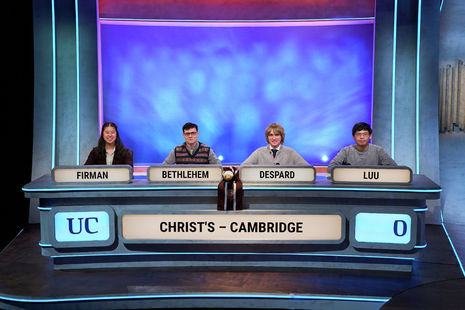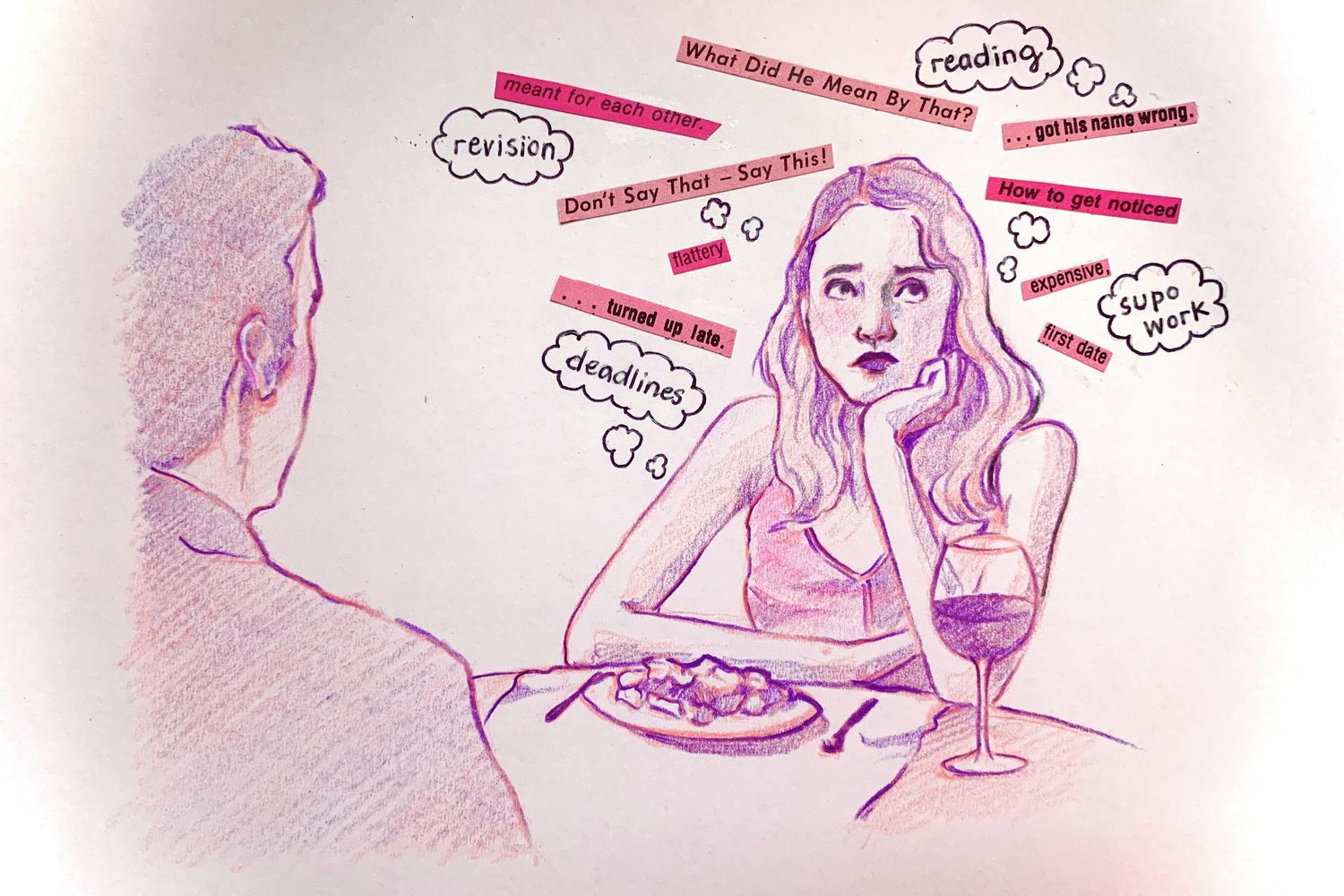Your starter for ten: behind the scenes of University Challenge
From on-set gaffes to filming secrecy, Jonathan Liu speaks to students on what it’s like being on University Challenge.

“There are three things that I always expected to happen at university – one was to lose my virginity, two was to be asked to become a spy, three was that I’d be on University Challenge”. So claimed Brian Jackson, protagonist of David Nicholls’ book and film Starter for Ten. Though not every student is either keen or able to tick off all three items from their bucket list, each year a handful of Cambridge’s keenest quizzers have the opportunity to complete the latter and appear on University Challenge.
Now in its 54th season, the quiz is one of the staple features of British television, regularly drawing three million viewers an episode. Every year over 100 teams from across British universities and Oxbridge colleges apply to be on the show. Each year, just 28 teams make the final cut. Last year, four of them were from Cambridge.
In order to narrow down from the 31 constituent colleges eligible to apply, each team has to go through an in-person interview made up of a general knowledge test and an informal chat with the producers. Whilst the first portion involves each contestant answering a set of recorded questions, the second portion of the interview is more subjective in its approach.
“None of my friends knew anything. I even turned off my Snapmaps”
Described by some players as a charisma check, aspiring contestants are told that as well as a “wide range of knowledge and interests,” they will be judged on whether they will “engage [the] audience as they play”. Though questions asked by the producers can be as innocuous as “if you could do any other subject what would it be?” and “what is your team’s biggest weakness?”, some participants choose to play up their quirkiness in the hopes of maximising their chance of being selected. Or, as former contestant Hollie Wright explained, “am I going to wear my cigarette earrings, naturally yes”. Former participant Zoe Zhang took a more realist approach: “everybody’s a bit kooky at Cambridge […] none of us would have been capable of outweirding the others”.
Filming for University Challenge takes place in three separate periods from February to April. However, with the set located in MediaCityUK, Salford, participants who get through to the final stages of the competition are required to keep their trips up north incognito to avoid spoilers leaking out. As Brendan Bethlehem, from Christ’s current 2024/25 team, explained, “[the producers] are not super strict about it legally, but they’re very much like, if you tell people [how well you do], it will ruin it for everyone”. When the filming for the quarter final clashed with Week 1 of Easter, Brendan explained how he had to “just disappear”. Leaving Cambridge to go home for Passover, Brendan took the train to Manchester instead of returning back. Secrecy was paramount: “None of my friends knew anything. I even turned off my Snapmaps”.
With no studio audience and faced with the set’s lighting, contestants look out onto a virtual void of black with only the quiz show host visible. Since 2023, the host has been Amol Rajan, replacing the long-serving Jeremy Paxman who had held the position for over 28 years. Paxman, Rajan and the rest of the production team were found to be “lovely” and “amazing”. Brendan recalled how Rajan “put his credit card behind the bar and was like, get whatever you want,” and how he was able to put a face to a voice when Roger Tilling, who provides the distinct voiceover to University Challenge, treated them all to breakfast.
“Paxman’s response was, “Christ, you’ve been a naughty girl””
However, filming is not without its mishaps. Along with mumbled answers, one of the most common reasons for reshoots is swearing. Hollie Wright recounted how when she realised the answer she was buzzing in for was incorrect she loudly exclaimed, “fuck!” Jeremy Paxman’s response was, “Christ, you’ve been a naughty girl”. For Hollie, this “amazing moment” was sadly unable to leave the studio as part of the final cut, instead requiring multiple awkward reshoots until she “correctly” delivered her incorrect answer.
For most participants, appearing on University Challenge is their first ever moment on television. And with these fifteen minutes of fame comes social media attention, both negative and positive. Though the production team tell contestants to avoid checking social media responses, Zoe Zhang shared that “any sense of vague embarrassment surrounding my involvement in the show was not strong enough to prevent me from making a Twitter search for #universitychallenge the morning after broadcast”. She found people comparing her and a teammate to Yoko Ono and John Lennon plus speculation on “theoretical beef between me and my captain”. “I suppose if you fail to deliver interest, viewers will create interest for themselves – out of thin air,” Zoe reflected.
“a friend working as a doctor was recognised by a patient mid-rectal exam”
Women particularly experience acute scrutiny under the social media lens. Eve Temmink, contestant in the upcoming 2025/26 season, described how she was sent into a panic by the thought of her pink, frilly blouse “looking rather too vulval” and being picked on online. This led to a series of last-minute frantic FaceTimes to friends for reassurance. This wouldn’t have been the first time a female contestant has suffered abuse for their choice of outfit. Melika Gorganieh, a student at Christ Church, Oxford, received a pay-out for damages from a Tory peer after her Zara coat was cast as a reference to the Palestinian flag, and their team’s octopus plushie as an antisemitic dog-whistle.
Without the anonymity of online spaces, when attention from the show bleeds out into the real world, responses tend to be more respectful. Former contestant Agnijo Banerjee described being recognised “at its peak, every few days” with people often complimenting him on how he always had a smile on his face. More awkwardly, one participant described how a friend working as a doctor was recognised by a patient mid-rectal exam.
However, for all the highs and lows of filming and public recognition, it was back in college that contestants could appreciate the sense of community. They may have cringed watching and hearing themselves up on screen, kicked themselves when they got a question wrong, but as former participant Anna Drummond-Young put it, more than any of that, “it was wholesome watching it all back with all my friends”.
 News / Judge Business School advisor resigns over Epstein and Andrew links18 February 2026
News / Judge Business School advisor resigns over Epstein and Andrew links18 February 2026 News / Hundreds of Cambridge academics demand vote on fate of vet course20 February 2026
News / Hundreds of Cambridge academics demand vote on fate of vet course20 February 2026 News / Petition demands University reverse decision on vegan menu20 February 2026
News / Petition demands University reverse decision on vegan menu20 February 2026 News / CUCA members attend Reform rally in London20 February 2026
News / CUCA members attend Reform rally in London20 February 2026 News / Gov grants £36m to Cambridge supercomputer17 February 2026
News / Gov grants £36m to Cambridge supercomputer17 February 2026










